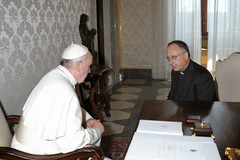NO ONE who follows the religious or secular press is unaware of the firestorm that Bergoglio (“Pope Francis”) ignited with his recent press interviews and public letters.
Understandably, the discussion centered on the meaning of Francis’ particular pronouncements (on atheism, proselytism, “judging,” conscience, no Catholic God, etc.) What in the world did this or that statement mean? How did it square up with previous Catholic teaching? Or did it at all?
Because each pronouncement seemed so surprising in itself, though, a larger question went mostly unasked: What, apart from Francis’ continuing popularity with the religious and secular left, will be the long-term effect of his recent statements as a whole?
This will inevitably be felt on the level of how the Church’s teaching authority is understood and perceived — and the consequences will be disastrous.
One can easily predict as much from the reaction of new-agey modernists like Richard Rohr who gleefully treated the Francis interviews as a watershed moment for the Church:
“He has forever changed the Catholic conversation. We can never go completely backward. No one can ever say a validly elected pope, with all that implies in anyone’s mind, did not say the things Francis said in the interview published Thursday. They will be quoted for a long time to come. It is now a part of the authoritative data, like the Gospels themselves, and must be reckoned with.”
Seen in this light, the Francis interviews are nothing less than 9/11 for the Church’s magisterium In effect, they first turn it into a generator of gibberish which needs to be decoded, and then they destroy its very foundations.
To understand why, we must first look at what the magisterium is and what is the pope’s role in it is supposed to be.
 1. Magisterium = Teaching Functions
1. Magisterium = Teaching Functions
The imposing Latin term magisterium is really very easy to understand. In general, it just means “the function of instructing others.”
The Church’s teaching magisterium (= docens) is directed at imparting the knowledge of sound doctrine and good morals to all the faithful.
Now, in the minds of most Catholics, the word magisterium is automatically linked to the word infallible, as in something like, “The magisterium of the pope is infallible when he issues an ex cathedra definition about faith or morals.”
The flip side of this, most Catholics conclude, is a principle that boils down to “No ex cathedra/infallible stamp, no obligation to believe.”
But this idea is completely false, for in addition to infallible magisterium, a Catholic is also bound by what is called authentic magisterium. This is the way the pope usually teaches Catholic doctrine and moral principles.
It works this way: A pope has the “power and office to teach doctrine” and as a Catholic you have “the obligation and the right to receive instruction.” The teaching of a pope is authentic in the strict sense, “because of the authority of God’s delegation that the teacher uses.” You would therefore “be bound to give it assent of the intellect,” because his teaching authority is founded in “a mission received from God, to which is attached divine assistance.” (Salaverri, De Ecclesia 1:503ff. His emphasis)
 2. Francis’ Interview Magisterium
2. Francis’ Interview Magisterium
Obviously, the overwhelming number of Catholics in the world consider Francis to be a true pope. So for them, where would we situate his disturbing interviews and public letters in terms of the principles outlined in point 1?
Writers such as Carl Olsen, who were appalled and embarrassed by many of Bergoglio’s statements, would respond: “Nowhere at all.” Papal interviews, he says, are “not magisterial in nature.”
Vatican press spokesman Fr. Frederico Lombardi joked that the material “isn’t Denzinger” — a collection of papal and conciliar statements on faith and morals. Francis is merely “giving pastoral reflections” which must “be distinguished from an encyclical, for instance, or a post-synodal apostolic exhortation, which are magisterial documents.”
But what exactly was Bergoglio doing if not publicly teaching about doctrine and morals, and doing so as pope? And teaching is exactly what “magisterial” means. As for pastoral, the first duty of the Supreme Pastor is what? “Feed my lambs, feed my sheep” — with sound doctrine.
Veteran Vatican reporter Sandro Magister nails down exactly what Francis is doing in the headline of an October 7 piece: “Encyclicals Have a New Format: The Interview.” The point Magister develops is this: Where previous popes used encyclical letters to communicate doctrinal and moral teachings to the world, Francis has now chosen a new means more suited to the modern age: press interviews. These carry his teaching throughout the world through the wonders of 21st century technology. The interviews, Magister says, are “the first acts of this ‘magisterium’.”
An exaggeration, perhaps?
Not at all. A pope is not restricted to one particular format when exercising his authentic teaching authority. Popes always had an array of options to employ when addressing doctrinal or moral questions: bulls, decrees, briefs, epistles, etc. They adopted the now-familiar encyclical letter only in the 18th century. In the 20th century, Pius XI and Pius XII added addresses and allocutions to the mix, and a good number of these did end up in Denzinger.
These different formats were merely various means that a pope used to teach. It was his choice.
There is therefore nothing to prevent a pope from using the web, press interviews or public letters to atheists to communicate his authentic teaching. The form of a communication does not create the obligation to assent. Rather, it is the fact that a pope is the “content provider” (as web-savvy types might say).
Indeed in January 2015, Bergoglio himself clearly stated that his public statements are “magisterium.”
“I’m constantly making statements, giving homilies. That’s magisterium. That’s what I think, not what the media say that I think. Check it out; it’s very clear.” Source
Those Catholics who regard Bergoglio as a true Successor of St. Peter are therefore not free to dismiss the content of his interviews and public letters as so much white noise. Rather, they must regard it as authentic teaching and consider themselves “bound to give it assent of the intellect.”
And it is here we begin to stare in horror at the effects of the first blow Francis has launched…
 3. A Magisterium that Teaches Gibberish
3. A Magisterium that Teaches Gibberish
To understand why, first recall how the Bergoglio interviews generated a seemingly endless stream of “What-the-pope-really-meant” articles in the Catholic press and blogsphere.
Novus Ordo Wire provides a lengthy list of the writers who felt compelled to weigh in: Fr. Dwight Longenecker (3 articles), Simcha Fisher, Jimmy Akin, Jeffrey Mirus, Elizabeth Scalia, Lalah Alexander, Jennifer Fitz, Joanne McPortland, Gerard Nadal, Thomas McDonald, Terry Nelson, Mary Eberstadt, Stacy Trascanos, Kathy Schiffer, Joseph Shaw, Joseph Susanka, Christopher Orlet, Edward Mulholland, Mark Shea, Carl Olsen, and of course, Fr. John Zuhlsdorf (at least 3 articles).
Whew!
A few of the article titles will demonstrate the level of confusion that Francis’ comments provoked: “What Did the Pope Really Say?” “Francis Will be Misunderstood,” Getting Pope Francis Wrong,” “I Am Too Sinful to Understand Pope Francis,” “The Problem is US, Not Francis; The Pope is Moving in Mysterious Ways,” and “The Good, the Baffling and the Unclear.”
The writers engaged in an elaborate exegetical process that attempted to reconcile Francis’ actual words with the established Catholic doctrines and moral principles that his words seemed to plainly contradict. And indeed, they had “a whole lot of ‘splainin’ to do.”
The pain and the puzzlement of the writers is evident, as is that of their readers. Fr. Zuhlsdorf even begins one such article by saying, “My email is filled with notes from people who need to be talked off the ledge.”
If we step back step back from the ledge and examine the whole process that Bergoglio’s statements unleashed, what we see is this: A magisterium that no longer actually teaches.
Bergoglio, supposedly its authentic teacher, to whose teaching we are “bound to give assent of the intellect,” publicly proclaims to the Universal Church doctrinal and moral principles which, on their face at least, contradict previous magisterial teachings. Private persons must then attempt to reconcile his teaching to previous teachings through an elaborate exegetical process.
We who are supposed to be taught by the authentic teacher must instead become gibberish decoders, wearing Joseph Smith-like spectacles to decipher the hieroglyphics he’s handed us.
Thus the statements in the Bergoglio interviews and letters blow the very purpose of the magisterium — to teach — all to smithereens. No one can understand the teacher’s message!
This would disastrous enough. But certain of Bergoglio’s statements combine to deliver a second attack in the form of a…
 4. A Magisterium that Destroys Its Own Foundations
4. A Magisterium that Destroys Its Own Foundations
This becomes apparent when you group summaries of Bergoglio’s outrageous statements under the general headings of either faith or morals.
(a) Faith: There is no Catholic God, doctrinal security exists no more, he who claims to have all the answers does not have God within him, proselytism is nonsense, atheists can go to heaven, etc.
These declarations blow away the meaning of the Creed, the nature of God, the possibility of arriving at doctrinal truths, the divine mission to convert others to those truths, and faith as a requirement for eternal salvation.
(b) Morals: Moral teachings (on the 6th and 9th commandments) are a disjointed multitude of doctrines that cannot be imposed insistently, one must not obsess about such matters (abortion, gay “marriage” and contraception), what is objectively adultery admits of a “pastoral solution,” who am I to judge, each one has his own vision of good and evil, spiritual interference in personal life is impossible, etc.
These declarations portray mortal sins as trifles, castigate as “obsessed” those who say otherwise, trivialize adultery, reprove moral judgments, enthrone the conscience as autonomous and supreme, and effectively renounce the right of the magisterium to tell the individual conscience anything.
It takes no effort to derive the underlying principle here: The magisterium of the Church can no longer deliver certitude about what to believe or how to act.
Poof! The whole edifice of the magisterium crumbles, its foundations forever undermined by what Italian theologian Peter De Marco calls Bergoglio’s “relativistic slippage.” Everything — everything — is subverted.
* * * * *
WE WILL no doubt, occasionally hear Catholic-sounding Bergoglian pronouncements that seem to contradict the modernist Bergoglianisms we’ve mentioned here. Indeed, this is happening already. Don’t obsess about abortions vs. aborted babies are “the face of Jesus.” Proselytism is solemn nonsense vs. Mission Sunday is really a great thing. Rosaries are Pelagian vs. let’s all remember that October is Rosary month.
Don’t be fooled. All this is just part of the modernist shtick that St. Pius X exposed in Pascendi. Modernists can be devout sounding Catholics on one page and near-agnostics on the next. Once you’ve figured how to relativize dogma and turn it into intellectual mush, you can say just about anything.
 In seven months, Bergoglio thus has stripped all the weapons from the perhaps 20% of souls in the post-Vatican II church who still cling to vestiges of the old religion’s doctrinal and moral teachings. Henceforth, their objections to modernist doctrinal or moral outrages will be met with quotes from the “authentic teacher” about small-minded rules, obsessions, no doctrinal security, no Catholic God, triumphalism, restorationism, ideologies, etc. Rest assured that modernists like Fr. Rohr will indeed forever treat these pontifical dicta “as part of the authoritative data.”
In seven months, Bergoglio thus has stripped all the weapons from the perhaps 20% of souls in the post-Vatican II church who still cling to vestiges of the old religion’s doctrinal and moral teachings. Henceforth, their objections to modernist doctrinal or moral outrages will be met with quotes from the “authentic teacher” about small-minded rules, obsessions, no doctrinal security, no Catholic God, triumphalism, restorationism, ideologies, etc. Rest assured that modernists like Fr. Rohr will indeed forever treat these pontifical dicta “as part of the authoritative data.”
For my part, I now state that I no longer consider Jorge Bergoglio merely a heretic. He is an apostate because he adheres to a system that rejects the possibility of religious truth and the objective moral law.
Apostasy is indeed, as St. Pius X warned, the final product of the modernist system. But Jorge Bergoglio didn’t get to be a modernist apostate by dint of his own efforts. He is a Vatican II product from top to bottom, and all his noxious and scandalous utterances against Catholic faith and morality are but the poisonous fruit of the seeds sown by that Robber Council.
There is a straight line from Vatican II’s ecumenism, religious liberty and pagan sects as tools of the Holy Ghost to Bergoglio’s no Catholic God, proselytism is nonsense, atheists go to heaven, I don’t judge and each of us has his own vision of good and evil.
There are tens of thousands more Bergoglios out there, so in the long run there is really only one cure for the disease. Get rid of what really caused the infection in the first place: Vatican II.
And if you hesitate to take advice from a sedevacantist, remember, “even a broken clock is right twice a day.”
Well, the time is now 10:28 AM — and the date is 9/11…
————————————————————————————–
Don’t like sedevacantists and want to toss a stone or two at Fr. C? Try these!
And for a short course on Francis, try this SGG Resources video:

One Trackback/Pingback
[…] I pointed out in 9/11 for the Magisterium: The Francis Interviews, has been the aggregate effect of a whole array of Bergoglio’s statements in sermons, […]